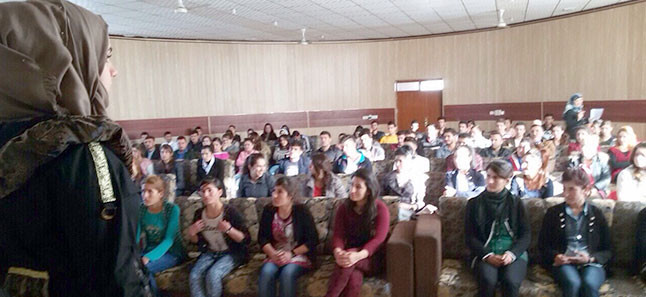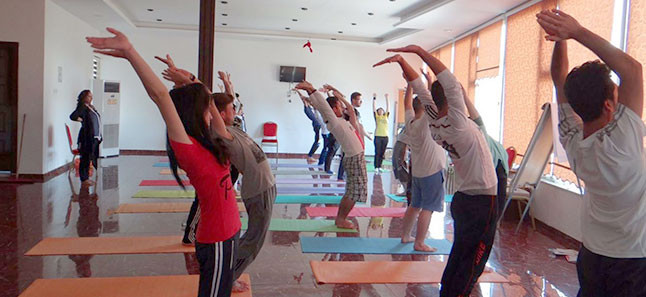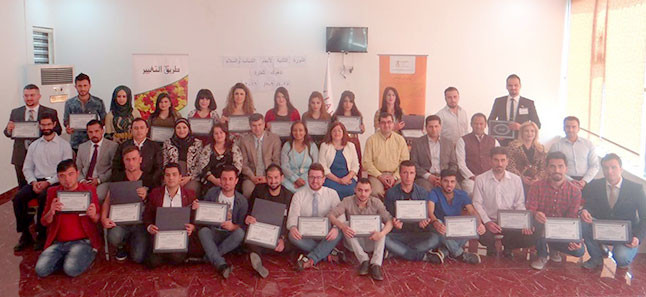Iraq, which has faced violence and severe economic disruption through decades of war, factional strife and vested interests, has been the backdrop for The Art of Living’s program - the Youth Leadership Training Program (YLTP). During Gurudev Sri Sri Ravi Shankar’s 2007 visit to Iraq - at a time when the war was at its height - a memorandum of understanding was signed under which the Art of Living proposed special YLTP programs to the Iraqi youth.
Gurudev’s has set up the Youth Leadership Training Program (YLTP) to disadvantaged youth. This is done by helping them overcome stress and simultaneously giving them the tools and knowledge to serve their community. The programs are being conducted in India and in several parts of the world, enabling youth with leadership, teamwork and communication skills.
We spoke to Tarique Khan, an Art of Living faculty member, and one of the many teachers who work in Iraq training the youth to first overcome stress and diffidence and then lead change in their communities. Here he shares his insights and experiences.
Q: When did The Art of Living YLTP programs begin?
A: In 2007, after Gurudev Sri Sri Ravi Shankar’s meeting with the Iraqi Minister of Youth and Sports.
55 Iraqi youth from Baghdad, Basra, Suleimania, Karbala, Najaf and Kurdistan came to The Art of Living International Center, Bengaluru, to take participate in the YLTP Program. Apart from undergoing the intensive Program course content, they also had the opportunity to interact with and learn from youth from other countries. After this, 34 specially-selected men and women from Iraq underwent a month-long train-the-trainer program which enabled them to gain a fresh worldview and perspective of life outside of their lives in war-ravaged Iraq.
Q: When was the latest YLTP held there? Were there any opposing factions in the one you recently conducted?
A: The latest YLTP was held on 25th of May, 2016 at Dohuk, in Kurdistan, Iraq.
Iraq has for long been a war-torn nation. So Yazidis cannot tolerate the Sunnis and vice versa. But this program made a lot of difference, bringing all these people from different backgrounds together for eight days. They came under one roof and experienced something so powerful and unifying and so easy to relate to. They have gained and internalized the understanding that they could work together for the betterment of the society.
Now they have combined and formed different groups, called the ‘Peace Ambassadors Group”, and, irrespective of their community or ethnic background, do community work.
Q: What was the backdrop in which you had to conduct these programs?
A: The two earlier ones were conducted for bringing people out of trauma because there was a huge war. People had lost their homes, their belongings, their loved ones. That was the time Gurudev Sri Sri Ravi Shankar first visited Iraq.
The two later YLTPs, which I took, were based more on spreading the message of love, peace and harmony to the people of Kurdistan.
Q: Was there any element of risk when you were conducting the programs? Was there war going on?
A: For the last one year, there has been no risk. The authorities and the people are cooperative with our volunteers.
The basic challenge is the language, because most people speak Kurdish, which is a little different from Arabic. We manage because we have a good translator.
Initially, getting the prospective participants to understand the benefits of the program took some effort.
People are from different backgrounds and have faced a lot of adverse situations down the decades, where their loved ones have been taken captive and their property destroyed and so on. So we have to be sensitive and conduct the program with a lot of love.
Q: What were the changes seen in the graduates of the YLTP program?
A: We put the participants in different situations and assign certain tasks to help them see the futility of holding on to grudges against each other based on ethnic differences. Now they work, like brothers and sisters, for society.
Before, people here used to think they were being victimized, targeted every time and being forced in to live in such a bad state. There was a lot of blaming and complaining. But after doing the YLTP courses, the graduates’ whole mind set has changed. They began to accept the situation as it is, and took necessary action to do whatever could be done, using whatever resources they had. They are now enthusiastic about serving society.
As I said, the Peace Ambassadors groups go to different IDP (internally displaced persons) as well as refugee camps to teach the Art of Living “Breath Water Sound Workshops”, which have more of yoga, meditation and other mind-relaxation techniques. They also raise the people’s awareness on water-conservation.
But a lot of work still needs to be done in terms of the youth. They have to be given a vision for themselves and for what they can do for their country.
Q: Would you like to share your plans for imparting this vision?
A: Yes, of course.
Firstly, through YLTP, the whole mind-set of the youth has been changing: they drop their accumulated stress, and become outgoing and tough. They become socially pro-active and also cannot be easily shaken by any person or incident.
To spread these benefits further, we would like to conduct the Happiness Program for 5000 Iraqi people, especially the Kurdish people.
Next, people need some kind of employment avenues to earn sustained income and to reclaim their financial dignity. The land in Kurdistan is so fertile and rich that educating the Kurdish youth in techniques of agriculture would be a very obvious and viable option. In the absence of a vision and a plan for employment generation, a lot of youth are migrating to European countries like Germany and Canada, Russia, and so on, despite the obvious risks involved.
So along with the soft-skills training in YLTP, we would like to impart livelihood skills.
Q: How is it like to work in Iraq?
A: Indians are respected in Iraq. It is my personal observation that when we have a very strong and powerful leader of our country, it impacts and reflects on any individual travelling to different countries.
Immigration and permits, and things like that, are easier to get.
Three voices
- “There are big powers who have big might, but they are not able unite the hearts and mind of people. This work can be done only by a spiritual leader.”
- Iraqi Prime Minister Nouri al-Maliki after meeting Gurudev - “If any country's citizens needed de-stressing it would be those of Iraq. The Art of Living Foundation has a history of taking on tough tasks. It has operated similar de-stressing courses in Macedonia, Kosovo, Croatia, Gujarat and in New York after the 11 September attacks.”
- BBC World News, January 14, 2004 - “We knew only death and despair. Now we can smile. This is the greatest gift that the Art of Living has given us.”
- Shafiqur Rehman, a trauma-relief program participant in Iraq.
Q: What has been YLTP’s contribution towards the rebuilding of Iraq?
A: It has been acting as a catalyst in gradually bringing together different, opposed communities, different ethnic groups and training them to jointly build a better society. They realize and experience that the only religion we have is the religion of humanity.
The YLTP graduates have begun to focus on social service. They are conducting the Breath Water Sound Course for more and more people. One of my participants is so charged up has taught some 275 people the Breath Water Sound Program in two weeks’ time.
What is heartening is that if the government or any other NGO need volunteers or any assistance for their projects, we have a large database of well-trained youth volunteers who go and help them.
Q. How many women have been covered in the YLTP course so far?
A: Approximately, the ratio of female to male participants was around fifty-fifty.
Q. Have any of the women got back to you after the course and shared how their lives have changed in Iraq, in the same situation?
A: Women especially have been through unimaginable upheaval. The YLTP program and its processes, especially the ones that encourage sharing of experiences, has helped the women immensely. It has also changed their whole outlook. They realize the importance of working for the society they live in. If anybody is suffering from domestic violence or any kind of problem, they reach out and counsel them. They now want to go and spread the same knowledge to the rest of their family members and female friends.
I also hope to help skill the YLTP graduates through livelihood training. Economic empowerment is so vital for the development of Iraq and its people.





